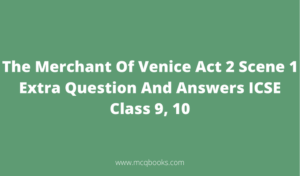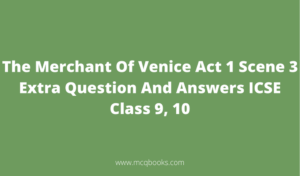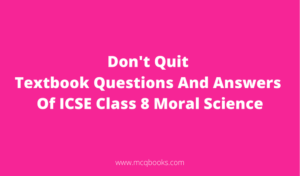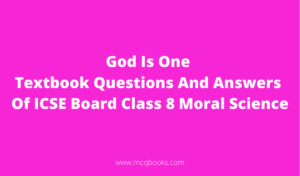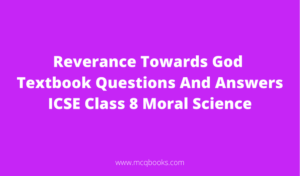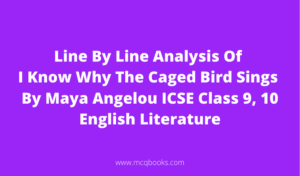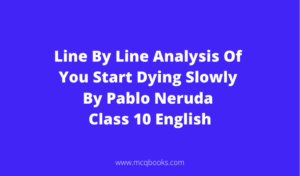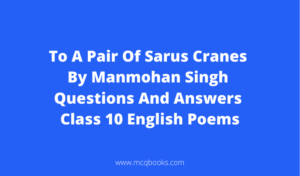The Merchant Of Venice ICSE Extra Questions And Answers Act 1 Scene 2 ICSE Class 9, 10
English is a difficult subject for many people to learn. Some students may become frustrated and give up, but here’s The Merchant Of Venice Act 1 Scene 2 Extra Question And Answers ICSE Class 9, 10 to help you maintain your momentum! This The Merchant Of Venice Act 1 Scene 2 Extra Question And Answers will provide all necessary information needed in order to study ICSE Class 9, 10 successfully at home or school; it includes detailed grammar rules with examples that were used during today’s class discussion on the ICSE Board English Exam.
The Merchant Of Venice Act 1 Scene 2 Extra Question And Answers makes it easier to understand the story. Understanding every detail of a story is important for scoring higher on an exam and expert writers have made sure that you know how everything flows together by summarizing perfectly!
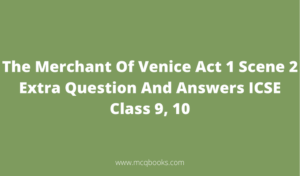
Act 1 Scene 2
1 . Who is Nerissa? What is her relationship with Portia? Where are Portia and Nerissa? Give the significance of that place.
Nerissa is Portia’s lady-in-waiting and a close confidant. She is a smart lady with a sharp tongue and a true sense of humour.
Portia and Nerissa share a strong bond of friendship. Portia completely trusted Nerissa and she confesses all her sorrows and happiness to Nerissa. Nerissa feels happy in Portia’s happiness and sympathizes with her when she becomes frustrated or sad.
Portia and Nerissa are at Belmont. Belmont is a rich land and many suitors from all around the world come to Belmont to participate in the lottery of casket to marry the most beautiful as well as the intelligent lady that is Portia.
2 . How does Nerissa explains the reason for Portia’s tiredness? And what was happiness according to Nerissa?
Portia confessed to Nerissa that she was tired of the great world. To that Nerissa says that she was tired despite her abundant good fortune and hence concludes that the one who has too much of everything is as sick as the one who starves as they have nothing.
According to Nerissa there is no happiness in too much of anything or in having nothing but happiness lies in between that is mid-way between poverty and riches. The one who has too much of anything will age sooner and the one who has just enough of anything will live a longer life.
3 . Explain briefly why was Portia sad and tired.
_ Portia’s dead father devised a lottery of the casket and according to the rules, the one who chooses the correct one will become eligible to marry Portia. Portia was sad and tired because she didn’t have the right to choose the husband of her choice. She could neither choose the person she likes nor rejects the one she dislikes. Her marriage was dependent on the suitor’s choosing the right casket. This made her tired of the great world.
4 . Give the difference between Antonio and Portia’s melancholy.
Antonio’s melancholic mood had no specific reasons. He was neither sad because of his business venture nor because of his love life. Antonio did not himself knew the reason behind his melancholy. His melancholy made him so depressed that he sometimes forgot his own identity which troubled him as well as his friends. Antonio’s melancholy might be an indication of some future happenings.
On the other hand, Portia had a specific cause behind her melancholic mood. She was an obedient daughter and hence couldn’t disobey her dead father’s wish regarding her marriage. Also, she was sad, because she didn’t have the freedom to choose her husband. She could neither choose the one she likes nor rejects the one she dislikes. Her fortune completely relied on the will of her dead father.
5 . What did Nerissa say about Portia’s dead father?
_ Nerissa praised Portia’s father by saying that he was always a virtuous and holy man. He devised this lottery of caskets to check who truly loved Portia. This lottery would be a character test of true love and this will ensure that Portia doesn’t regret choosing a life partner. This shows the caring and loving nature of a father.
6 . Describe briefly the lottery of the casket.
_ The lottery of the casket was devised by Portia’s dead father. This lottery would determine the future of Portia. The one who chooses the correct one amongst the three that is gold, silver and lead would marry Portia. This was a test of character whether the man truly loved Portia or loved just her wealth. Portia was so beautiful and intelligent that suitors from all around the world came to Belmont by overcoming hundreds of hurdles just to try their luck.
7 . What was the reaction of Portia and Nerissa to the lottery of casket?
_ Portia showed the least interest in the lottery of casket. She was anxious about this idea as she didn’t know who is going to choose the right casket. She was also sad because she didn’t have the freedom to choose the person she loves and reject the one she dislikes. This made her sad, depressed, tired of the great world.
On the other hand, Nerissa had a very positive outlook towards the lottery of casket. She praises Portia’s dead father for devising such a lottery that would test the real character of a man. By seeing Portia’s negative outlook regarding the casket she assures her that the one she loves would surely choose the correct casket.
8 . Who was the first suitor Nerissa named? What description did Portia give about him?
The first suitor Nerissa named was Neapolitan Prince from Naples.
Portia described him as an inexperienced young man just like a young horse. He does nothing but talks to his horse the whole day long. He considers it as great merit that he can shoe his horse.
9 . Who was County Palatine? Why did he come to Belmont?
County Palatine was a local ruler or a nobleman from Palatine, the region on the west bank of the Rhine.
He came to Belmont to participate in the lottery of caskets device by Portia’s dead father. He came here to try his luck and test whether he was eligible to marry Portia.
10 . How did Portia described County Palatine?
_ Portia said that County Palatine was a depressed soul. He did nothing except frowning. . He heard marry tales but still didn’t had a single sign of a smile on his face. Portia feared that he would completely get converted into a weeping philosopher when he turns old as he was surrounded by an unpleasant sadness during his youth. Portia said that she would rather marry a death’s head(skull ) than marry him and prays god to protect herself from him.
11 . Who is the weeping philosopher? Why is he referred to in the extract?
Heraclitus of Ephesus was a pre-Socratic Greek philosopher who is considered as the “weeping philosopher”. He had a substandard opinion of human affairs. He became so depressed and frustrated with mankind’s stupidity that he went to live alone in the mountains far away from human follies.
County Palatine did nothing except frowning. He remained so depressed that he didn’t even smile listening to happy tales. So Portia feared that he may turn into a weeping philosopher when he turns old due to his depressed nature.
12 . Who was the next suitor named by Nerissa? What were the similarities between him and Neapolitan Prince?
Nerissa next named the French Lord , Monsieur Le Bon.
Earlier, in this scene, Portia described Neapolitan Prince as an inexperienced young man like a young horse who talks only about his horse the whole day long. The French Lord even talks more about his horse than Neapolitan Prince. This was a striking similarity between the two.
13 . How was the French Lord compared to County Palatine?
_ County Palatine did nothing except frowning which made him so depressed that he did not smile by hearing marry tales. The French Lord had quite a similar character with him. He had a more exaggerated bad habit of frowning than County Palatine.
14 . What character sketch did Portia give about French Lord?
_ Portia described French Lord as “ he is every man in no man” which means he has everybody else’s personality but had no personality of his own which would make him unique from others. He immediately starts jumping up and down out of excitement when he heard the throstle( the common English bird) sing. He is such a fool that he draws his sword against his own shadow. Portia said marrying French Lord would be like marrying twenty husband’s as he had everybody else’s characteristics.
15 . What would happen if the French Lord would hate Portia or would love her passionately?
_The French Lord was a person of mixed character and did not have a personality of his own. So, Portia had no interest in him as marrying him was like marrying twenty husbands. Portia said that if the French Lord would hate her she would not mind and forgive him but if he would love her madly she would never return his love.
16 . Who was the next suitor named by Nerissa? Describe his external appearance.
The next suitor was Falconbridge, the young baron of England.
The young barren of England was very strangely and oddly dressed and not well mannered. He bought his jacket from Italy, his breeches from France, his had from Germany and his behaviour from everywhere.
17 . What was the main reason, Portia, for rejecting the young baron of England?
_ If the young baron of England would win the lottery of a casket, then there would be a lack of communication between him and Portia. Portia could say nothing to him as neither Falconbridge understands him nor she does. He neither understands Latin, French or Italian and Portia had very little knowledge about English.
18 . How does the dressing pattern of the young baron throw light on the sense of clothing of Englishmen?
_ The young Baron dressed in a very strange and odd manner. He bought his jacket from Italy, breeches from France and his hat from Germany. This shows that the Englishmen during Shakespeare’s time had no dressing sense of their own and were more attracted towards the style and fashion sense of the foreign countries.
19 . Who was the neighbour of the young baron? Give a brief description.
The Scottish lord was the neighbour of the young baron.
Portia was not impressed by the Scottish Lord. She made fun of him and called him a coward because of his foolish deeds. He was given a blow from the Englishman but didn’t return the blow immediately instead he said that he would return the favour when he would be able to return that. And Portia guessed that the young baron was the guarantee of that bond.
20 . What type of relationship is revealed among the English, the French and the Scots?
_ From the context we get to know about the alliances between the French and the Scots. They made alliances against England when England and the Scots fought against each other where the French supported the Scots.
21 . Who was the next suitor? And how did Portia described his behaviour?
The next suitor was the young German, the Duke of Saxony’s nephew.
Portia said that the young German behaved very badly when he was sober and he also behaved the worst when he was drunk. When he was at his best be he is worst than a man and he is at his worst he was a little better than a beast. Portia would prefer to manage without him instead of marrying him.
22 . What was Portia’s plan against the young German?
_ Portia could never accept him as her husband. That’s why Portia planned to keep a deep glass of Rhenish wine in the wrong casket. Portia guaranteed that the devil would choose the casket which had the wine in it and happily depart from Belmont. Portia said she could do anything but she won’t marry a drunkard.
23 . Give the meaning of the following:-
When he is worst, he is better than a beast.
Portia said to the young German that he is at his best he is worst than a man and when he is at his worst he behaves better than a beast.
Set a deep glass of Rhenish wine on the contrary casket.
To divert his mind, Portia said Nerissa to place a large glass of Rhenish wine in the wrong casket which would divert his mind and will make him choose the wrong casket.
24 . What is a sponge? Why is the young German is compared with a sponge?
_ A sponge is something that absorbs or soaks up liquid. The young German is referred to as a sponge because he absorbs all the liquor. He was a complete drunkard and did not know how to behave. At his best, he was worst than a man and at his worst, he was a little better than a beast.
25 . What good news did Nerissa revealed to Portia regarding the suitors?
_ By seeing Portia being worried, Nerissa consoled her by saying that she need not fear as the suitors have informed her that after hearing the terms and conditions of the lottery of the casket, they would rather prefer to return to their kingdom than to participate in the lottery by risking everything they had.
26 . Describe in brief Sibylla.
_ Sibylla is a Greek word that meant “prophetess”. Sibyl of Cumae was granted a wish by goddess Apollo. According to the wish, she would live for as many years as the grains of sand she held in her hands. She was considered the ageless old woman. But she failed to ask for eternal youth and hence goddess Apollo allowed her body to wither. As a result, her body grew smaller with age and was kept in a jar.
27 . Give a description of Diana.
_ Diana was considered as the “ Bright Goddess”. In Greek mythology, she was known as the goddess of virginity. She was also the goddess of the moon and hunting. Also, she was in connection with the wild animals and the woodlands. She was a symbol of chastity.
28 . Why are “Sibylla” and “Diana” referred to here? And what light does it throws on Portia’s character?
_ Portia said Nerissa that she would live as old as Sibylla and die as chaste as Diana but wouldn’t marry anyone until someone fulfils the conditions imposed by her father regarding her marriage. This shows how loyal and obedient daughter Portia was. She stayed loyal to her father’s will even if she knew that her happiness was at stake.
29 . About whom did Nerissa remind Portia? What was Portia’s reaction?
_ Nerissa reminds Portia about a Venetian, a scholar and a soldier of his father’s time who came with the company of the Marquis of Montferrat( the title of an Italian nobleman). Portia showed her interest in that man and said that she remembered him, his name is Bassanio. This shows her excitement and interest in Bassanio.
30 . What compliment did Nerissa give to Bassanio?
_ Portia said that out of all the men that her foolish eyes had looked upon, Bassanio was the best who deserves the fair lady Portia. Portia says that she remembers him very well and he is worthy of Nerissa’s praise.
31 . What information did the servant give to Portia?
_ The servant informed Portia about the departure of the four suitors. On the other hand, the messenger of the fifth suitor informed about the arrival of the Prince of Morocco who will reach Belmont that night to test his luck by participating in the lottery of casket.
32 . What was Portia’s reaction to that?
_ Portia said she could offer a good welcome to the fifth suitor the way she bid farewell to the other four suitors even if she was tired of them. She then says that if he had the condition of a saint and complexion of a devil, then he would rather prefer to hear her sins and grant forgiveness like a holy man than marry her. She was tired as she shuts the gate upon one suitor and at the very next moment, another suitor knocks at the door.
Questions And Answers
What is the setting of Act 1 Scene 2 in The Merchant of Venice?
At her estate in Belmont, near Venice, Portia complains to her servant Nerissa that she’s “aweary of this great world”.Anyone who wants to marry Portia must choose one of three “caskets” (chests), each marked with a clue. One is made of gold, one of silver, and one of lead.
What is Portias mood Act 1 Scene 2?
Portia and Nerissa are in a room in Portia’s house at Belmont. They are discussing the lottery of caskets and about the suitors who have already come to try their luck. In this scene, Portia is in a mood of melancholy and anxiety.
What are the good sentences said by Nerissa?
You would be, sweet madam, if your miseries were as abundantas your good fortunes are; and yet, for all I see, they that are sick from over-eating are as sick as those that starve with nothing.
What is the significance of Act 1 Scene 2?
The main significance of this scene is that it gives the audience a view of Macbeth’s character up to this point in his life and shows the rewards that Duncan is going to give him for his service.
What is the dramatic significance of Act 1 Scene 2?
No one has been hurt or lost at sea. In addition to relating the past, this act also helps define the main characters and anticipate the future. Prospero has been injured, and he intends to serve justice on his captives.
What is the short summary of Merchant of Venice?
Antonio, an antisemitic merchant, takes a loan from the Jew Shylock to help his friend to court Portia. Antonio can’t repay the loan, and without mercy, Shylock demands a pound of his flesh. The heiress Portia, now the wife of Antonio’s friend, dresses as a lawyer and saves Antonio.


